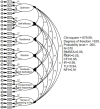Introducing a new concept: Psychological capital of older people and its positive effect on mental health
- PMID: 37020912
- PMCID: PMC10067571
- DOI: 10.3389/fpsyg.2023.1083077
Introducing a new concept: Psychological capital of older people and its positive effect on mental health
Abstract
Objective: This study aimed to explore the structure of psychological capital (PsyCap) and its positive effects on mental health among older people.
Methods: Study 1 used grounded theory to analyze the semi-structured interviewing data of 17 Chinese older people (60-96 years old) to develop a primary PsyCap questionnaire for older people. Study 2, respectively, applied exploratory factor analysis (EFA) with 198 Chinese older people (M = 69.2; SD = 6.685) and confirmatory factor analysis (CFA) with 370 Chinese older people (M = 73.84; SD = 9.416) to test a seven-factor structure for PsyCap. Study 3 used 328 participants (M = 79.73; SD = 9.073) to examine the correlation between PsyCap and mental health.
Results: Study 1 identified that PsyCap of older people contains 'resilience,' 'self-efficacy,' 'optimism,' 'ease and content,' 'gratitude and dedication, 'wisdom,' and 'meaning in life' and generated a primary seven-factor questionnaire. Study 2 proved the overall and internal structure reliability of PsyCap were good (Cronbach's alphas ranged 0.809 ~ 0.935), and the seven-factor measurement model fitted the data well (χ 2/df = 2.07, RMSEA = 0.05, RMR = 0.05, CFI = 0.95, IFI = 0.95, TLI = 0.94, NFI = 0.91). The PsyCap scale was also proved to an excellent convergent validity, discriminant validity, calibration validity, and measurement invariance across different groups. Study 3 found that PsyCap and its seven factors significantly correlated with depression (r = -0.419 ~ -0.163, p < 0.01) after controlling the demographic variables.
Conclusion: These findings provide a reliable and valid assessment for quantitative empirical research of PsyCap among older people and show significant impacts on mental health among older people, which offers new insight into improving mental health from the perspective of positive psychology.
Keywords: mental health; older people; psychological capital; reliability; validity.
Copyright © 2023 Xin and Li.
Conflict of interest statement
The authors declare that the research was conducted in the absence of any commercial or financial relationships that could be construed as a potential conflict of interest.
Figures
References
-
- Ashraf F., Khan M. A. (2017). Broadening the positive psychological capital construct: an Asian cultural perspective. J. Independent Stud. Res. Manage. Soc. Sci. Econ. 15, 91–105. doi: 10.31384/jisrmsse/2017.15.2.7 - DOI
-
- Avey J. B., Reichard R. J., Luthans F., Mhatre K. H. (2011). Meta-analysis of the impact of positive psychological capital on employee attitudes, behaviors, and performance. Hum. Resour. Dev. Q. 22, 127–152. doi: 10.1002/hrdq.20070 - DOI
-
- Azimi T. (2014). The role of psychological capitals in predicting mental health and well-being of female employees in the education of dehdasht. Indian J. Fundam. Appl. Life Sci. S4, 1297–1304.
LinkOut - more resources
Full Text Sources
Miscellaneous


